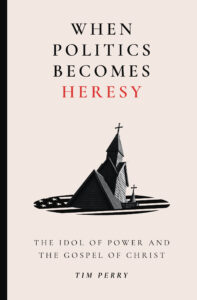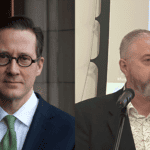
With election season upon us, Lexham Press is sharing some adapted portions from Tim Perry’s upcoming When Politics Becomes Heresy: The Idol of Power and the Gospel of Christ. In this book, Perry identifies ways that evangelicals are falling into “heretical logic” by exchanging the heavenly eternal realities of the Gospel for earthly and temporal political goals. In the post below, Perry summarizes two classic heresies and their modern outworking when evangelical Christians seek political power.
Evangelical Pelagianism
Once the gospel becomes a political program, once it is no longer an announcement about the act of God, we become the agents responsible for the accomplishment of that program. The temptation to build the kingdom on our own, which I have called Pelagianism, has become far too attractive to many politically engaged evangelicals, whether we tilt to the right or the left.
Consider these familiar words from the psalmist: “Put not your trust in princes, in a son of man, in whom there is no salvation. When his breath departs, he returns to the earth; on that very day his plans perish” (Ps 146:3–4). Evangelical Pelagianism is at its core a naïve trust in those the psalmist calls “princes”— that is, our political class. Let’s set aside the charges and counter-charges of corruption, crimes, and nasty behavior that dominate our headlines, and just consider what the psalmist says. Our politicians are unfairly, unwisely, and even unkindly burdened with our ultimate trust, not because they are wicked, but because they are human. Perhaps this strikes you as obvious, but it cannot be underemphasized. If we inadvertently alter the psalmist’s caution to something like, “put not your trust in that prince, for he is wicked,” we have not faced the problem fully. We will have left open the possibility that our ultimate trust will be worthily laid at the feet of our prince. And once our guy (or gal) is in charge, then everything will be better. This misreading is, in our current climate, perfectly understandable. But it is wrong. It is cover for the Pelagian that lurks within each of us, who says in his heart, “Their guy can’t build the kingdom. But ours can.” The psalmist advises us to withhold from them the trust proper only to God, especially when they seem to demand it more and more, because they are human beings. They are mortal. They will lose an election. They will die. And when they do, their plans will be undone. They will not deliver the kingdom.
God (publicly) raised Christ from the dead, and that this event had begun the remaking of the world. That event is the sign of the coming of God’s kingdom and the basis for our confidence. If we have lost our nerve, and lapsed in our trust in the God who raises the dead, then politics is all we have left. And if politics is all we have left, God help us all. We are above all people most pitiable.
Evangelical Donatism
Do you have the right views on climate change? Global poverty? Human sexuality? And while it might be familiar for the evangelical right to trot out these tropes, its members are hardly alone in doing so. Disagree with certain members of the evangelical right or left on any of these hot button issues, and you will find an old fundamentalist preacher ready to be unleashed.
If our opponents to these questions can be written out of the conversation by labeling them climate deniers or evil globalists, we don’t actually have to listen to a position that may compel us to modify ours. We are right and virtuous; they are wrong and evil. The solution is not to listen; the solution is to compel them to shut up, lest they persuade people with misinformation.
The lesson of Donatism for late modern evangelicals is this. Once we’ve convinced ourselves—sometimes with good reason!—that we’re the good guys, there’s no amount of mischief we won’t get up to.
If we come to believe so fiercely that we are building the kingdom that we will not countenance any criticism of our program, it’s all too easy to see our opponents not simply as mistaken, but as evil. And evil must be eradicated. If God’s on our side, we’ll start the next war.
This post was adapted from When Politics Becomes Heresy: The Idol of Power and the Gospel of Christ by Tim Perry (Lexham Press, 2025).







